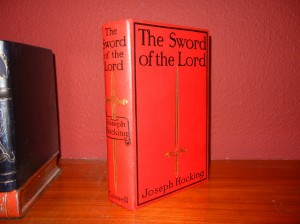I’ve been told that this blog post — which is really a book review — is going to tick some people off. I honestly hope not. But if so, so be it ….
The Sword of the Lord is a romantic tale of adventure written by Joseph Hocking over 100-years ago. I bought my copy at Chaucer Head Bookshop in Stratford-upon-Avon. The inside cover has a label that indicates it was a prize awarded to “Mary” at the “Children’s Sixth Protestant Demonstration” in 1910. I liked the style of the book binding and the curious story of a young girl receiving it as a gift.
I didn’t really plan on reading the book.
But once I understood the storyline it seemed fitting for my trip to England. The book is historical fiction set in the Protestant Reformation. That’s about the time my ancestors lived in Southern England. Even if the book is fiction, it could still give context to the world my forefathers lived in.
The storyline follows the adventures of a heroic English nobleman who was asked by King Henry VII to rescue an English noblewoman who was held by untrustworthy German counts. Turns out that the Germans were in league with the Catholic Church to squelch Martin Luther. Our hero ends up saving the lady, vanquishing the Germans, and protecting Martin Luther as he stands up to the Pope. He returns to England and marries the noblewoman.
The plot is predictably weak, the characters are one dimensional, and the formal writing is over the top. But it was fascinating anyway. Not fascinating for it’s literary value, and not for the context it added to my understanding of England in that day.
It was fascinating for how the book represents a historical bias against Catholicism.
Okay, I can hear my Catholic friends squirming at this point. Please understand that I’m not advocating an anti-Catholic bias. The Sword of the Lord is a relic of a different age, and offers an insight into the mindset of that age. Yes, I can understand that the purpose of the book is insulting to Catholics. But it is also a clearcut example of that bias, and we can learn about our history by understanding it.
Anti-Catholic sentiment drove a good chunk of Northern European and American history since the Reformation (and it’s legacy is still with us). It’s important to understand the roots of that sentiment even if you disagree with it. I don’t agree with all of it, of course, but I do want to understand it from a historical context.
Plus my family was deeply involved in the development of Protestantism in America. My ancestors came to America as Puritans. They abhorred all things “Popish” and felt that the Church of England had not gone far enough to separate itself from Rome-like practices. So they moved to America. For my ancestors who landed in Massachusetts Bay Colony nearly 400-years ago, faith was all about a direct relationship with God. The Bible was the supreme authority, not the Pope.
Those viewpoints shape our faith today. It shapes our country. Indeed, our world. This book is an echo from the past, and though disturbing at times, it is still important to understand.
And let’s be honest … no sensible reading of the book today would influence your perspective on Catholics. The book’s lack of subtlety actually makes it seem silly at times. In the story, every clear thinker, every courageous fighter, and every honest man or woman is convinced of Luther’s wisdom. Every dullard, every coward, every scoundrel is a supporter of the Pope. Evenhanded it is not. The book’s intent was so blatant it sometimes made me laugh.
Despite the excesses that this book represents, I agree with the goal of the Reformation to make Christ preeminent. I admire the courage and integrity of Martin Luther because that was missing in the early 1500’s. Both Catholicism and Protestantism have had their issues over the centuries, but the Reformation clearly forced a change that was better for all.
And this simplistic book — even with all of it’s over-the-top bias — is a reminder that the Reformation was important. My family history, so intertwined with Protestantism for at least twelve generations, models the same sentiment.
Both remind us that the Sword of the Lord is a powerful force in history. Whether Protestant or Catholic, we can all agree with that.

